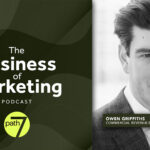By Kris Medford Rossi Ph.D., Senior Strategy Director, Design Bridge and Partners
January gets credit as the time for our better selves, but February was a banner month for forgiveness.
On February 4, we watched host Ayo Edebiri roast her younger self on SNL, implicitly referencing the digs she had made towards Jennifer Lopez on a podcast in 2020. In the aftermath, Lopez, who was coincidentally (or not) the musical guest that week, disclosed that Edebiri had also offered a private, personal apology. Lopez not only downplayed the initial snub but gave credit to the genuine apology and seemed to encourage everyone to move on.
The next weekend, in the midst of the post-Superbowl glow for the Kansas City Chiefs, much was made of the image of Travis Kelce appearing to yell at his coach during the first half when the Chiefs were down. Now imagine, the talented, good-natured boyfriend of America’s sweetheart yelling at his coach in public! When faced with questions about it, Coach Reid was charitable, acknowledging their close relationship and attributing it to Kelce’s passion and commitment.
And just a few days after that we saw Dolly Parton speak out to encourage forgiveness for Elle King, following a January incident in which the young singer had taken the stage during her 78th birthday celebration only to give a rambling, drunk monologue. Dolly told E. News in an interview that her fans should let it go, as she already had: “She just had a little too much to drink, so let’s just forgive that and forget it and move on, ’cause she felt worse than anyone ever could.”
We don’t know for sure, but is it possible that a sea change of sorts is happening, such that we’re shifting away from the rampant cancel culture which has notably marked the last several years?
It may be too soon to tell, but what is evident is the fact that there’s a genuine lesson here about the (brand building) power of forgiveness. In a time when the fear of catastrophic consequences can keep people and brands on high alert, and even in a state of inaction, it’s not surprising that we can miss the impact of a thoughtful—dare I say kind—response when something does happen. Now not all acts can or should be forgiven—publicly or privately—but some can. And it doesn’t even take an act of apology to kick off the process to move on and move forward.
But what are the takeaways for a brand? If you’ve been wronged and forgiveness is possible, here’s what you can do.
Step 1. Bring it back down to earth.
The world wants to make this a big one. Popcorn munching gifs are flying, just waiting for the feud. Outrage is imminent. But what if it’s just not warranted? Help others to see that and minimize the impact by offering context. Lopez let us know that Edebiri’s initial slight wasn’t significant to her—it just wasn’t a big deal. Afterall people make mistakes—and brands make mistakes, too. Affirming that simple reality starts the process of de-escalation that is key to getting back on message.
Step 2. Set the tone by offering forgiveness – as directly as possible – and encourage others to follow suit.
At a time when cancel and outrage are daily specials, it’s refreshing to remind people that simple forgiveness, the off-menu option, is possible. Nothing throws water on a growing fire like empathy, especially if it’s encouraged by the one who was wronged. Take a page from Coach Reid and Dolly by taking it a step further and encouraging us to feel compassion. Travis just wanted to help his team win. Elle is going through some hard times. Make us remember that we have all been there at one time or another, and surely we would have appreciated some humility. If the wronged party is willing to forgive, continuing to have outrage somehow feels unjustified.
Step 3. Move forward.
Forgiveness isn’t click-bait, but continuing to rehash the feud will be. It will keep you stuck and that doesn’t help your brand to evolve and grow. JLo, Coach Reid, and Dolly have more important messages to carry. Your brand does too. Stay focused on your own story and don’t get pulled in or pulled back. And when it comes up again as a resurfaced clip on a slow news day in five years? Go back to step one and take a fast pass to step three.






